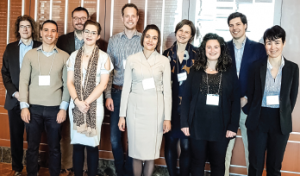
The 2018 ACR/EULAR exchange attendees.
Since 1998, the ACR/European League Against Rheumatism (EULAR) Exchange Program has supported junior academic rheumatologists, rheumatology professionals and health professionals in rheumatology in traveling from Europe to the U.S., and vice versa, to exchange clinical and research skills, expertise and knowledge. The program is designed to recognize outstanding early career faculty in rheumatology research, so we consider ourselves particularly lucky to be among the successful applicants.
As applicants in the October 2018 exchange, we represented both the clinical [Ioannis Parodis, MD, PhD (IP)] and ARP branches [Katie Druce, PhD (KD)] of the ACR audience. We like to think this is a testament not only to the appeal of the exchange program, but also to its selection criteria. Indeed, our group of 10 members included biomedical scientists, faculty, post-doctoral researchers and clinical research fellows from across different parts of Europe, with areas of interest spanning the full spectrum of rheumatology.
Background
KD: I’m a non-clinical research associate at the University of Manchester, England, with a background in psychology and epidemiology. I received my PhD in 2015 from the University of Aberdeen, where I focused on the relationship between fatigue, pain and disease activity in rheumatoid arthritis. Since I moved to Manchester, my research has included investigating sleep and fatigue in rheumatic diseases using remote monitoring technology, such as smartphone apps, sleep/activity monitors and at-home blood sampling techniques.
I applied for the exchange program largely due to the positive experiences two of my local colleagues had while on exchange in the preceding two years. I was told the exchange would be an exciting opportunity to meet with international peers and senior researchers, to share my work and learn from much admired experts in the field. It is safe to say the exchange did not disappoint.
IP: I’m a physician with a degree from the University of Athens, Greece, and have practiced at the Karolinska University Hospital in Stockholm since 2011. I have been a consultant rheumatologist there since 2012. I also teach and coordinate teaching activities in internal medicine at the medical school of the Karolinska Institutet. However, my heart really lies within clinical and translational research in the field of systemic lupus erythematosus. More specifically, I’d like to understand the connection between histology and clinical phenotype in lupus nephritis, and identify factors—clinical, histological or molecular—that predict long-term kidney outcomes. I am interested in the optimized use of conventional and new biologic therapies, studying clinical and immunological effects of treatments (e.g., anti-B-cell-activating factor [BAFF] treatment) and in an increased awareness of the importance of the patient’s perspective as an integral part of the clinical evaluation.
My application for the exchange program was prompted by a letter from EMEUNET (the Emerging EULAR Network), but it wasn’t until after I received the acceptance letter that I realized how blessed I should feel to have been chosen as a participant. I remember Prof. Lars Klareskog from my unit telling me he still had contact and collaboration with participants from such exchange programs during his early career years.
